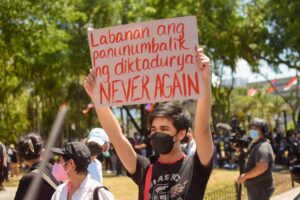The following article is based on an input delivered at a panel on tactics to counter disinformation, as part of “Democracy, Information, and the cultural capital of Religion: Sharing Global Best Practice on Press and Election Manipulation”, a workshop organised by The Open University last January 17-18, 2024 in London, the United Kingdom.
As an example of people’s research, the text below cites an ongoing collaborative study on the World Bank’s SPLIT programme in the Philippines. This study is in partnership with five local farmers’ associations (Asosasyon ng mga Magagmay nga Mangunguma kag Mamumugon sa Brgy. Orong; Asosasyon ng mga Mangunguma kag mamumugon sa Cantaghap; Buhi nga Aksyon para sa Kauswagan kag pag Amlig sa Seguridad sang Mangunguma kag Mamumugon; Kauswagan sang Bino para sa Buhi kag Hilway nga Palangabuhian; Kauswagan sang Mamumugon, Mangunguma sa Bino); Paghida-et sa Kauswagan Development Group, a local CSO in Negros Occidental working on development issues; Kilusang Magbubukid ng Pilipinas, or the Peasant Movement of the Philippines; People’s Coalition on Food Sovereignty, a global network of peasants, small producers, and food sovereignty advocates; and the Centre for Economic and Social Rights. You can access the research here.
The Marcos dictatorship in the Philippines during the 1970s and 1980s is known for its lies and myth-making. State machinery has played roles to perpetuate these lies and myths that propelled the dictator’s son, Ferdinand Marcos Jr., to the highest seat of state power.
Among these lies: that the dictatorship era was a golden age. They claim that public infrastructure in Metro Manila, from specialised hospitals to a massive cultural centre that serves as a venue for international exhibits and performances, were signs of the Philippines’ glory days under the dictator’s regime. The truth needs reiteration: the Marcos dictatorship killed 3,200 people; imprisoned 70,000 people; and tortured 34,000 people. The public infrastructure that the dictator’s family boasts of was funded by people’s taxes and built by workers.
The Marcoses have the resources, allies among elites, and machinery to systematically disseminate lies. There are also gaps in institutionalised memory-making. The edifices built during the Marcos dictatorship are humongous and imposing. Efforts by institutions dedicated to commemorating the martyrs of the dictatorship and accounting its horrors are neglected and even vilified.
The Marcoses’ rehabilitation has been systematic since the ouster of Marcos Sr. in 1986. It started when the US government-sponsored their exile in Hawaii, where Ferdinand Sr. succumbed to illness. The rest of the Marcos family were allowed to return to the Philippines in 1991. Since then, they have held various public posts, escaped from full state recovery of their ill-gotten wealth, and, in the last national elections, distorted the history of Martial Law with the aid of well-resourced social media operations. All these helped propel the dictator’s son, Marcos Jr. to the highest seat of power in the 2022 national elections.
History is still being distorted through state institutions. The country’s education ministry ordered to scrub off the Marcos family name from discussions of the dictatorship period in school books. Vice president Sara Duterte, daughter of former president Rodrigo Duterte who’s currently being investigated by the ICC for his drug war killings, currently leads the education department. In 2016, the previous Duterte administration allowed the burial of the dictator Marcos in the Libingan ng mga Bayani (Cemetery of Heroes).
In this context, IBON International’s knowledge outputs proceed from people’s realities in the Philippines 1 and the rest of the Global South. The organisation’s work centres on contesting the myths and narratives of the extractive, profit-driven, and warmongering economic and political order, and the elites and despots that champion this system.
Chipping away at neoliberal myths
One of IBON International’s recent collaborative research outputs, on the implementation of the World Bank’s market-assisted land reform project in the Philippines through the Support for the Parcelisation of Land for Individual Land Titling (SPLIT) project, chips away at neoliberal narratives around land tenure, and highlights farmers’ realities.
The World Bank funds and works on the project with the Philippines’ Department of Agrarian Reform (DAR). According to the World Bank, SPLIT aims to “improve land tenure security and stabilise property rights of agrarian reform beneficiaries (ARBs).” How do they aim to do this? By subdividing or breaking up collectively-held land titles to generate individual land titles. For the World Bank and DAR, farmers’ land rights are equivalent to individual land titles.
The Bank has loaned the Philippine government USD 370 million, financing 78% of the total budget of the project. The government says that the project helps farmers realise their lifelong dream of a land all their own, ushering a new and wealthy future.2 In its three years of implementation, the project has accomplished merely 9% of its targets, covering 48,471 beneficiaries out of an estimated target of 750,000. Initially set to end in 2024, DAR intends to extend it for another two years until 2026.
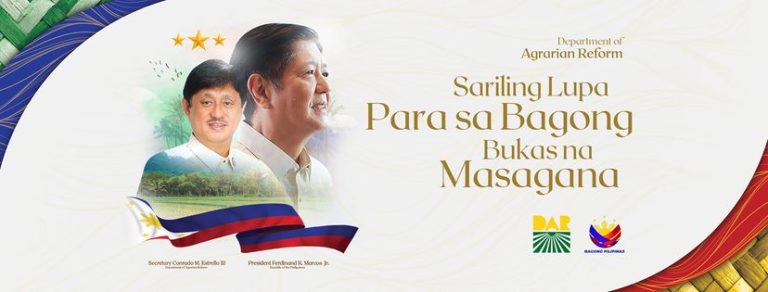
One of the areas of SPLIT implementation is in Kabankalan, Negros Occidental. Our discussions with farmers’ organisations there showed that SPLIT has worsened their already difficult realities.
According to the farmers’ organisations, before the implementation of SPLIT, they made their livelihoods from the collective cultivation and stewardship of land that they obtained from the government’s past agrarian reform programs. The lands that they collectively own were not distributed without struggle. The farmers’ associations were formed by former tenant farmers in sugar plantations owned by local political elites who organised themselves to assert their right to land and break free from destitution and indebtedness.
Farmers relayed a common experience of being deceived by local government officials and subjected to harassment and intimidation by state forces to submit to the implementation of the SPLIT project, without dialogue and consensus. Farmers raised concerns and even expressed outright opposition to the project for violating their right to collective ownership of land, and upending collective systems and practices of production and stewardship. Moreover, they are wary that breaking up their collective land ownership and organisational power easily facilitates land reconcentration to corporations and the local elite for commercial agriculture for imports or destructive “development” projects.
The struggles shared by farmers affected by the project implementation in Kabankalan dispute and disprove the government’s narratives. Similar to past state agrarian reforms from Marcos Sr.’s Presidential Decree 27 to the succeeding administration’s Comprehensive Agrarian Reform Program (CARP), the SPLIT project has failed to redistribute land. It threatens farmers’ rights to own and control the land that they till.
Breaking through the din of despotic regimes
Last January 29, Marcos Jr. launched his electoral-winning anthem “Bagong Pilipinas” (New Philippines) into a campaign that supposedly “calls for deep and fundamental transformation in all sectors of society and government to foster a unified commitment towards nation-building.” The government spent PhP 29 million for the launch of the campaign. Marcos Jr.’s campaign blatantly draws from his dictator father, Marcos Sr.’s “Bagong Lipunan” (New Society) – a mirage of a utopic Philippine society conjured to obscure the plunder by foreign corporations, Marcos and his cronies, and the mass starvation and poverty of the majority.
The dictator’s son is showing similarities to his despotic and United States-aligned father, despite attempts to rebrand the Marcos name. The current administration’s bid for constitutional change will remove nominal vestiges of sovereignty and completely open the country to unbridled foreign plunder in the name of investments, and could allow him and fellow political elites long-term rule. His administration brandishes agrarian reform to facilitate land reconcentration and monopoly. Similar to his father’s time, activists expressing dissent and fighting destructive foreign extractive projects have been forcibly disappeared.
History teaches us that we need a whole toolbox to topple despots – education and campaigning to raise peoples’ consciousness, and organising our warm bodies to be able to collectively and strategically act. People’s research, an abbreviation of the practice of producing research that tackles issues from the perspectives and experience of the people and communities, is a tool that we could use to break through the din of despotic regimes, and attune us to the realities that we need to contend with to realise development based on social justice. #
1Our mother organisation, IBON Foundation, was established in 1978, six years after the declaration of Martial Law. Its first publication was called Facts and Figures which provided what its title promised – facts and figures on national and local issues. Over time, allies outside of the Philippines saw the value of sharing knowledge through capacity development and partnerships. This led to growth of its international work, which necessitated establishing a distinct, but closely coordinated, organisation as IBON International.
2A reference to the DAR’s slogan, “Sariling Lupa Para sa Bagong Bukas na Masagana” (My own land for a new and wealthy future).
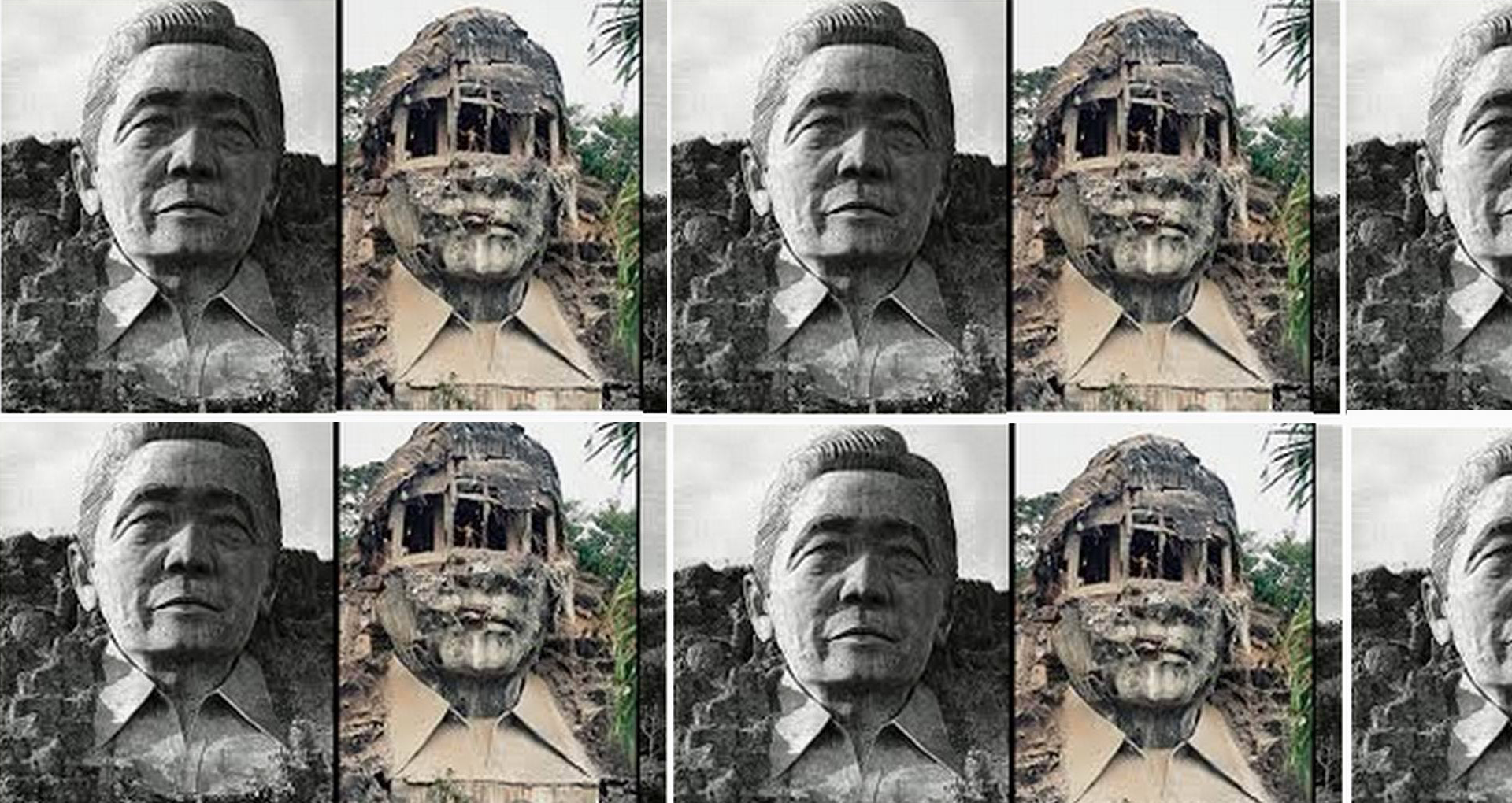
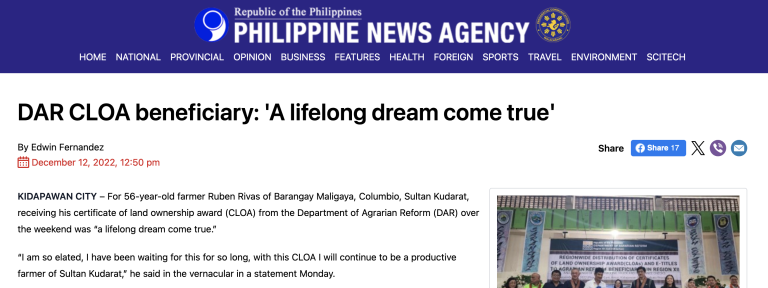
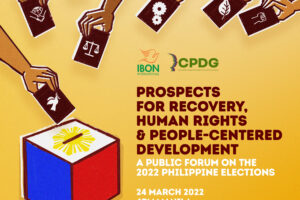
![[NEWS] PH CSOs call: Support and engage civil society for people-centred dev’t plans](https://iboninternational.org/wp-content/uploads/2022/09/IMG_2035-300x200.jpg)

